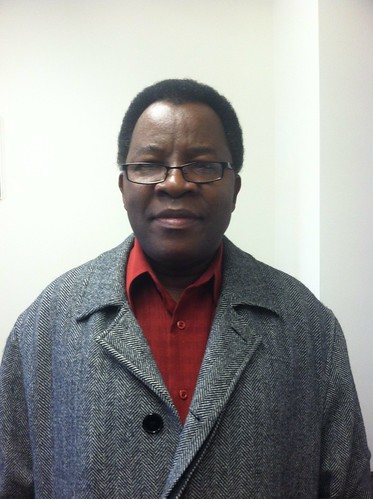For the continuation of our staff introductions, I interviewed Atoma Batoma, who is an Associate Professor, CAM/Metadata Services/Monographic Cataloging. While his office is just a couple of steps away from my workstation, I only get to speak with him every once in a while. I was curious to find out more about Atoma, so I decided to interview him in order to get to know him better.

Atoma Batoma, our African Studies Librarian
Could you tell me a bit about your background? Where did you grow up and what school did you attend?
I grew up in a small village called Koukoude located in a mountainous region in North Togo. I attended a Presbyterian school until sixth grade.
What attracted you to librarianship?
After several years of teaching French and philosophy as a part timer, I decided to go back to school and get a practical degree that would help me get a more stable job. I have a degree in philosophy of language from a European University and I wanted an American degree in a discipline that complements my PhD.
What area did you decided to specialize in and why?
I decided to specialize in cataloging because the cataloging process is somewhat similar to the rule governed nature of philosophical reasoning.
I am aware that you speak several languages, how many? And how and why did you decided to learn them?
It depends on what we mean by “speak”. I can say for sure that I speak French and Kabye which is my mother tongue, as we call it in English. I have been using English since I came to the United States, but for me, English is my survival language. I still have to learn it in a formal way. I used to speak German back when I was in Europe. I still speak it from time to time with friends. I read it on a daily basis. Swahili is another language that I am fond of and which I try to speak on a daily basis. I am now learning Spanish in an intensive way and hope to spend some time in Latin America next year to improve my speaking knowledge.
What are your research or collection development interests?
My research is on African onomastics, that is, the study of African names: their characteristics, structure and functions. I am particularly interested in three onomastic research areas: anthroponomy or the study of personal names, toponymy (or the study of place names), and zoonymy (or the study of animal names). My main approach is socio-pragmatic; I am interested in finding out how African names are used as means of social and interpersonal communication.
When you’re not working, what hobbies do you have? What do you like to do around the Champaign-Urbana area?
Gardening and reading children’s books are my favorite pastimes. Once in a while I drive to Meadowbrook Park on Windsor Road and walk around the park for an hour or so. In the summer time I go to the Farmers Market at Lincoln Square almost every Saturday morning. After the market I stop by Urbana Free Library or Strawberry Field for a cup of tea.
Describe a typical day at your job
I start my day at 8:00 a.m. or 9:00 a.m. by checking my e-mail and answering urgent messages from patrons and colleagues both on campus and from other institutions. In case I do not have meetings to attend I spend the rest of the morning working on committee-related projects (I am on local as well as national library committees). I take my lunch time at noon or 1:00 p.m. depending on the progress I made on my morning work. I prefer to eat lunch at the Espresso Royal where I can hide in the back of the café and read a children’s book or news in a foreign language (usually in Swahili or Spanish). My afternoons this month are dedicated to meetings with patrons and/or colleagues, working on the IAS division related projects and on the third edition of Al Kagan’s Reference Guide to Africa.
What career advice would you give to someone who is interested in librarianship or someone who wants to specialize in your area of interest?
It is important to learn at least one foreign language and take classes in African Studies. To specialize in African librarianship it is important to learn at least two major African languages (Swahili, Arabic, Hausa, Amharic, etc.) in addition to at least two colonial languages (English, French, German and Portuguese). It is also important to take classes in African Studies.
What are your proudest accomplishments as a librarian?
Helping with the training of RDA both at this Library and at two African Libraries: The Tanzanian University library in Dar es Salaam, and Makerere University in Uganda. RDA (Resource Description and Access) is the new cataloging standard which replaced AACR2 (the Anglo-American Cataloging Rules) in 2013. Prior to becoming the new African Studies Librarian this year I worked in technical services division for several years and as a cataloger I helped eliminate the Africana backlog.
What is something at the International and Area Studies Library that people should know about? (a service, collection, or book?)
Check out the impressive Africana collection and the Brown Bag presentation on Shea Butter Production in Africa that we have just added under the Category of “Africa and Gender”.
(Author’s note: This event has passed, but for other Brown Bag Lectures, be sure to check out the outreach website )
I am happy to say that I know more about a staff member at the International and Area Studies Library (IAS). Keep an eye out for our interviews with more staff members! For more information about IAS’s Africana Collections and Services, make sure to visit their website.

